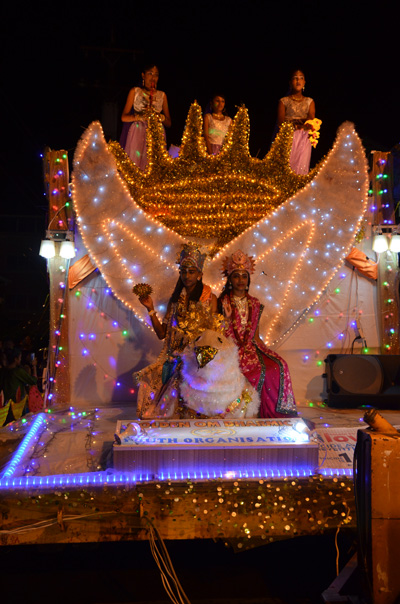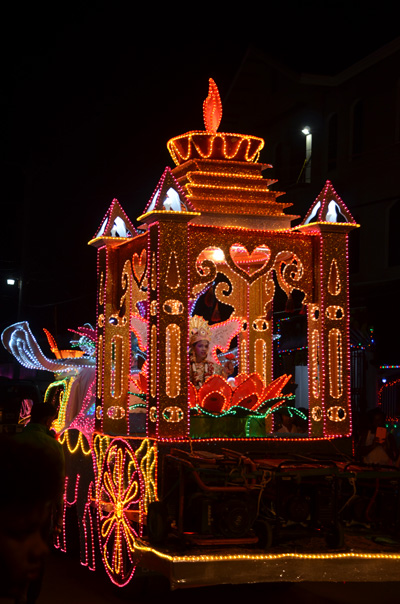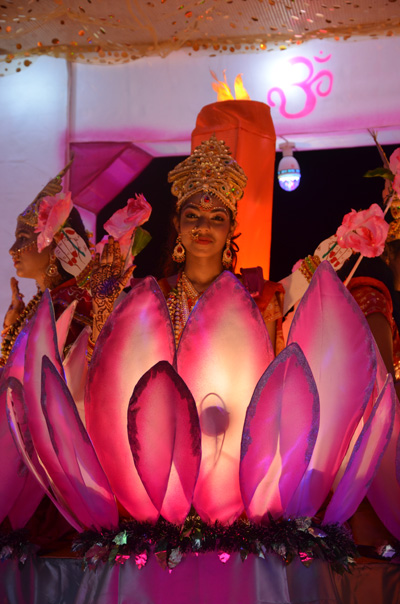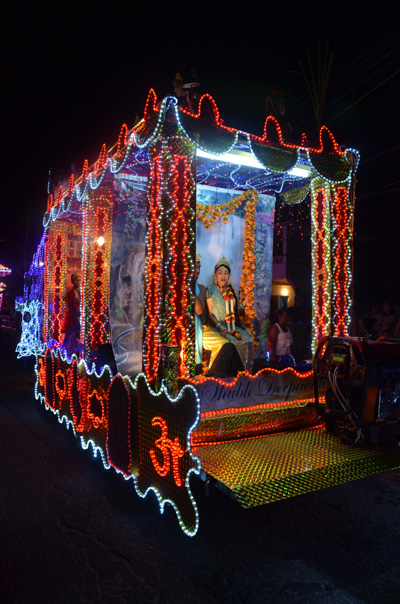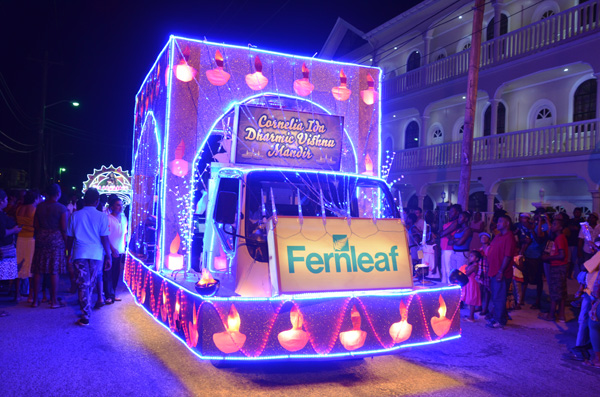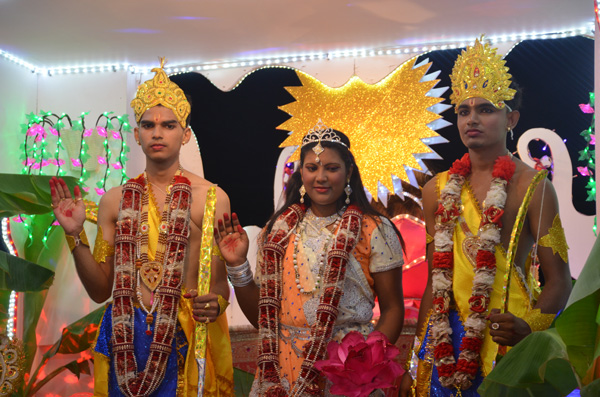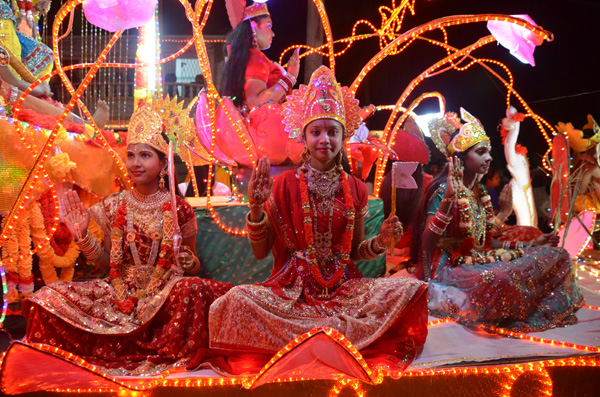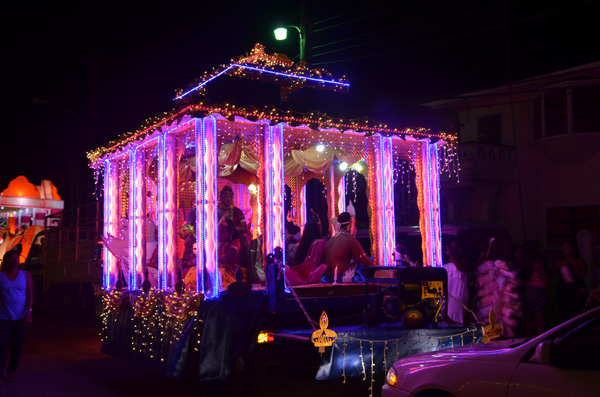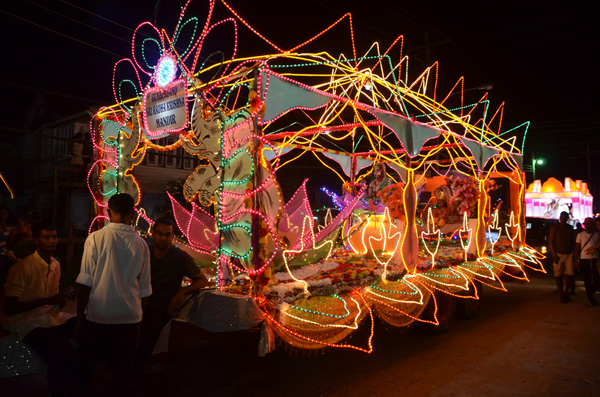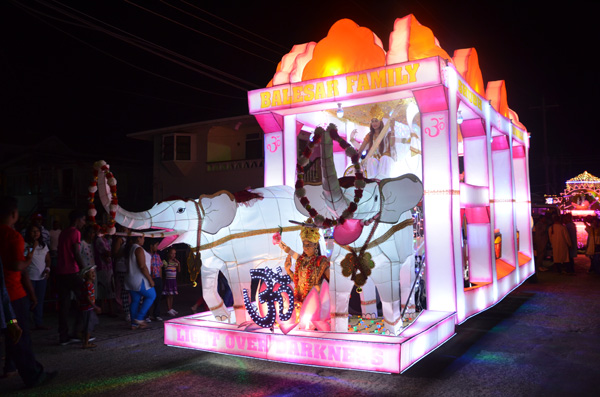Thousands gather to view kaleidoscopic Diwali motorcade
By Rabindra Rooplall, November 11, 2015, Source
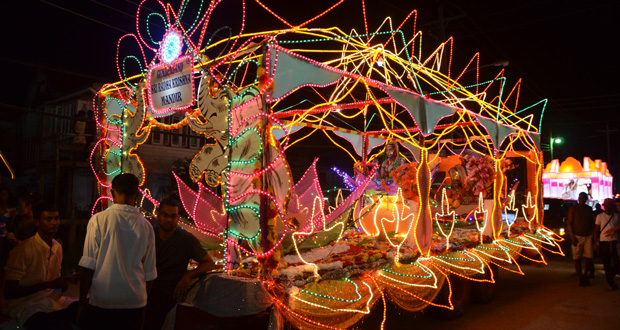
THE controversy in the date for celebrating Diwali did not prevent the Guyana Hindu Dharmic Sabha from staging a most spectacular Annual Deepavali Motorcade last evening, nor did it dissuade multiple thousands from lining the East Coast Demerara (ECD) seawall to observe the kaleidoscopic spectacle which ushered in the Festival of Lights.Last evening saw gorgeously bedecked motorcades sporting the representation of Mother Lakshmi and other depictions from the Hindu scriptures ensconced amidst intricate designs and much more Diwali dazzle, and accompanied by devotional music. Most floats sat atop pick-up and Canter trucks and makeshift carriers towed by vehicles.
The scene was a breathtaking sea of lights and colourful costumes accentuated by dancers and singers accompanying some floats, moving to the rhythmic beat of the tassa drums while some lucky spectators jostled to catch sweets thrown into the crowd.
More than a dozen fabulously decorated floats had assembled at the Shri Krishna Mandir in Campbellville before moving west along Campbell Avenue into Sandy Babb Street, north into J.B. Singh Road, and east along the Rupert Craig Highway as the motorcade wended its way to the LBI Community Centre Ground, ECD.
The motorcades have grown over the years to include artistic depictions of Hindu Gods and Goddesses, most notably Mother Lakshmi, hailed as the Goddess of light and wealth. Children dressed as the God Vishnu and the Goddess Lakshmi lent the event an enviable display of creativity as the marvellous pieces glided through the streets.
The Guyana Hindu Dharmic Sabha will nevertheless be celebrating Diwali today (November 11, 2015) in the face of claims from other Hindu organisations that the correct date is November 10 (yesterday), which has been decreed a national holiday by the Government.
TOO SIGNIFICANT
The motorcades commenced in 1974 after the Sabha’s President, the late Pandit Reepu Daman Persaud, thought that the festival of Diwali was too significant an occasion to just be restricted to the lighting of diyas on Diwali night.
While Diwali is popularly known as the ‘Festival of Lights’, the most significant spiritual meaning is “the awareness of the inner light”.
In Hinduism, across Guyana, Diwali is the homecoming of Lord Rama after a 14-year exile in the forest, and his victory over Ravana. In the legend, the people of Ayodhya (the capital of his kingdom) welcomed Rama by lighting rows of lamps.
The story behind Diwali and the manner of celebration varies from region to region. For Hindus, Diwali is one of the most important festivals of the year. Families celebrate Diwali by performing traditional activities together in their homes, and this event takes on a life of its own, with persons from all walks of life participating as either spectators or participators in the festival of lights being celebrated. The event features festive fireworks, worship, sharing of sweets and lighting of diyas.
Traditionally, Diwali marks the end of the harvest season. Farmers give thanks for the bounty of the year gone by, and pray for a good harvest for the year to come.
Diwali, the “victory of good over evil” is a holiday of joy. It is the time when devotees gather with loved ones to celebrate family and friends, and the prosperity God has bestowed upon them. Diwali also marks the New Year. For some, the day of Diwali itself is the first day of the New Year; and for others, New Year’s Day is the day following Diwali. But for all this, the season is one of heralding in the New Year.
On Diwali Day, devotees clean every room of the house, dust every corner of the garage, sweep behind bookshelves, vacuum under beds and empty cabinets.
But what about our hearts? When was the last time that we swept out our hearts? When did we last empty them of all the dirt and garbage that have accumulated throughout our lives?
This is the true focus of the festival, the inward light of higher knowledge dispelling all ignorance that masks one’s true nature; not as the body, but as the unchanging, infinite, immanent and transcendent reality.
With this awakening come compassion and the awareness of the oneness of all things (higher knowledge). This brings joy or peace. According to the Hindu calendar, Amavasya or ‘no moon day’ is considered the perfect day to celebrate Diwali. This dark night comes after every fortnight; and in the month of Kartik, it marks this festival of lights and diyas.

